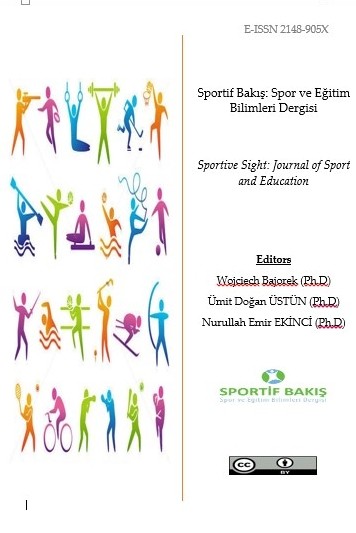THE EFFECT OF RECREATIONAL SPORT PARTICIPATION ON ACADEMIC MOTIVATION
The aim of this study was to investigate the effect of recreational sport participation on
academic motivation. Totally, 144 students (108 male, 36 female) were taken part in this research. Data
was gathered through Academic Motivation Scale which was developed by Vallerand et al. (1992) and
translated to Turkish Language by Karagüven (2012). The scale has 28 items. In evaluation part for
questionnaires answered by participants, in addition to Kolmogorov Smirnov normality test, T-Test
and One Way ANOVA tests were applied. According to the results, it was statistically determined that
there were significant differences on recreational participation, free time activity, recreational
practising frequency and age (p<0,05); but there were not significant differences on analyses done for
gender (p>0,05).
Anahtar Kelimeler:
recreational sports, free time activity, academic motivation
THE EFFECT OF RECREATIONAL SPORT PARTICIPATION ON ACADEMIC MOTIVATION
The aim of this study was to investigate the effect of recreational sport participation on
academic motivation. Totally, 144 students (108 male, 36 female) were taken part in this research. Data
was gathered through Academic Motivation Scale which was developed by Vallerand et al. (1992) and
translated to Turkish Language by Karagüven (2012). The scale has 28 items. In evaluation part for
questionnaires answered by participants, in addition to Kolmogorov Smirnov normality test, T-Test
and One Way ANOVA tests were applied. According to the results, it was statistically determined that
there were significant differences on recreational participation, free time activity, recreational
practising frequency and age (p<0,05); but there were not significant differences on analyses done for
gender (p>0,05).
Keywords:
recreational sports, free time activity, academic motivation,
___
- Akandere, M., Özyalvaç, N. T., & Duman, S. (2010). Ortaöğretim öğrencilerinin beden eğitimi dersine yönelik tutumları ile akademik başarı motivasyonlarının incelenmesi (Konya Anadolu Lisesi Örneği). Selçuk Üniversitesi Sosyal Bilimler Enstitüsü Dergisi, (24), 1-10.
- Amrai, K., Matlagh, S.E., Zalani, H.A. and Pahon, H. (2011). The relationship between academic motivation and academic achievement student. Procedia Social and Behavioral Sciences. 15, 399-402.
- Axelsen, M. (2009). The power of leisure: I was an anoexic; I’m now a healthy triathlet. Leisure Sciences; 31: 330.
- Bjelica, D. L., & Jovanovic, U. D. (2016). It’s up to you: the influence of sports participation, academic performances and demo-behavioural characteristics on university students’ life satisfaction. Applied Research in Quality of Life, 11(1), 163-179.
- Brightbill. Charles. (1960). The Challenge of Leisure. Englewood Cliffs. NJ: Prentice Hall.
- Castelli, D. M., Hillman, C. H., Buck, S. M., & Erwin, H. E. (2007). Physical fitness and academic achievement in third and fifth grade students. Journal of Sport & Exercise Psychology, 29(2), 239–52.
- Deci, E.L., & Ryan, R.M., (1985). Intrinsic Motivation and Selfdetermination in Human Behavior. New York: Plenum.
- Dirmen, A. (2014). Farklı Liglerde Oynayan Kadın Futbol Takımı Oyuncularının Başarı Motivasyon Düzeylerinin Karşılaştırılması. Master Thesis, Marmara Üniversitesi, Sağlık Bilimleri Enstitüsü, İstanbul.
- Doğar, Y. (1997). Türkiye’de Spor Yönetimi, Adana: Öz Akdeniz Ofset, s.69.
- Başlangıç: 2014
- Yayıncı: Ümit Doğan ÜSTÜN
Sayıdaki Diğer Makaleler
DİJİTAL OYUN OYNAMA TUTUMU ÖLÇEĞİ (DOOTÖ): Geçerlik ve Güvenirlik Çalışması
Gönül TEKKURŞUN DEMİR, Tuğba MUTLU BOZKURT
AEROBİK PERFORMANS VE SOLUNUM İLİŞKİSİ
FUTBOL TARAFTARLIĞI, ÖZDEŞLEŞME VE KİMLİK: TARAFTARLIKTAN FANATİZME...
EĞİTSEL OYUNLARIN ZİHİNSEL ENGELLİ ÇOCUKLARIN ÖFKE DÜZEYLERİNE ETKİSİ
Serkan ZENGİN, Alper Tunga PEKER
THE EFFECT OF RECREATIONAL SPORT PARTICIPATION ON ACADEMIC MOTIVATION
Osman GÜMÜŞGÜL, Ceren GÜMÜŞGÜL
Mihri Barış KARAVELİOĞLU, Sait ALTIKAT, Gizem BAŞKAYA, Eda GÖKÇELİK
